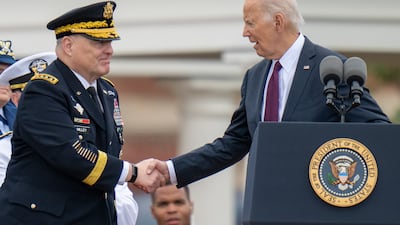Gen Mark Milley stepped down on Friday as the US military's top officer, with a parting swipe aimed at his former boss Donald Trump, saying no soldier ever swore an oath to serve a “wannabe dictator”.
The stunning rebuke from Gen Milley on his last day as chairman of the Joint Chiefs of Staff illustrated the way the US military has been dragged into the increasingly volatile political arena since the Trump era.
At an elaborate military ceremony for his departure – attended by Defence Secretary Lloyd Austin and President Joe Biden – Gen Milley did not name Mr Trump, but there was no doubt about the target of his barb.
“We don't take an oath to a king, or queen, or a tyrant or a dictator,” Gen Milley said of American soldiers. “And we don't take an oath to a wannabe dictator.”
Gen Milley will be replaced as chairman of the Joint Chiefs of Staff by Air Force General Charles “CQ” Brown – the second African American to hold the top military job. Colin Powell was the first.
A barrel-chested army veteran of countless foreign deployments and high-level command posts, Gen Milley served in uniform for four decades.
But he faced his highest-stakes challenge when Mr Trump appointed him in 2019 to the career pinnacle of senior military adviser to the president.
During a four-year term – continuing under Mr Biden from 2021 – Gen Milley managed the harrowing exit of US troops from Afghanistan, special forces operations in Syria, and the enormous programme to assist Ukraine's desperate fight against Russian invasion.
As chairman, “it was one crisis right after another”, Gen Milley told AFP last month.
His years at the top, however, also saw the military involved in an unusual number of politicised controversies.
While the Biden administration has pressed for changes including renaming bases named after Confederate leaders in the Civil War, senior Republicans have repeatedly lashed out at what they claim are “woke” leftist policies in the ranks.
That was nothing compared to the precarious situation Gen Milley found himself in during the lead-up to and aftermath of the 2020 presidential election – in which Mr Trump, in an unprecedented political nightmare for the US, refused to accept defeat.
At the height of tension after Trump supporters stormed the US Capitol on January 6, 2021, Gen Milley secretly called his Chinese counterpart to reassure Beijing that the US remained “stable” and had no intention to attack China, according to the book Peril by Bob Woodward.
That revelation has caused lasting fury for Mr Trump, who this month wrote on his social media network that “in times gone by, the punishment would have been DEATH” for Gen Milley.
The barely veiled threat from Mr Trump – the clear front-runner to be the Republican candidate in the 2024 presidential election – prompted Gen Milley to take “appropriate measures” for his safety, he told CBS News.
Mr Biden lashed out on Thursday during a speech at Mr Trump's “heinous statements” and attacked the “deafening” silence from Mr Trump's fellow Republicans on the threat.
Gen Brown – who officially takes the reins from Gen Milley at midnight on Saturday – was commissioned as a US Air Force officer in 1984 and is an experienced pilot with more than 3,000 flight hours, 130 of them in combat.
Mercer, the investment consulting arm of US services company Marsh & McLennan, expects its wealth division to at least double its assets under management (AUM) in the Middle East as wealth in the region continues to grow despite economic headwinds, a company official said.
Mercer Wealth, which globally has $160 billion in AUM, plans to boost its AUM in the region to $2-$3bn in the next 2-3 years from the present $1bn, said Yasir AbuShaban, a Dubai-based principal with Mercer Wealth.
“Within the next two to three years, we are looking at reaching $2 to $3 billion as a conservative estimate and we do see an opportunity to do so,” said Mr AbuShaban.
Mercer does not directly make investments, but allocates clients’ money they have discretion to, to professional asset managers. They also provide advice to clients.
“We have buying power. We can negotiate on their (client’s) behalf with asset managers to provide them lower fees than they otherwise would have to get on their own,” he added.
Mercer Wealth’s clients include sovereign wealth funds, family offices, and insurance companies among others.
From its office in Dubai, Mercer also looks after Africa, India and Turkey, where they also see opportunity for growth.
Wealth creation in Middle East and Africa (MEA) grew 8.5 per cent to $8.1 trillion last year from $7.5tn in 2015, higher than last year’s global average of 6 per cent and the second-highest growth in a region after Asia-Pacific which grew 9.9 per cent, according to consultancy Boston Consulting Group (BCG). In the region, where wealth grew just 1.9 per cent in 2015 compared with 2014, a pickup in oil prices has helped in wealth generation.
BCG is forecasting MEA wealth will rise to $12tn by 2021, growing at an annual average of 8 per cent.
Drivers of wealth generation in the region will be split evenly between new wealth creation and growth of performance of existing assets, according to BCG.
Another general trend in the region is clients’ looking for a comprehensive approach to investing, according to Mr AbuShaban.
“Institutional investors or some of the families are seeing a slowdown in the available capital they have to invest and in that sense they are looking at optimizing the way they manage their portfolios and making sure they are not investing haphazardly and different parts of their investment are working together,” said Mr AbuShaban.
Some clients also have a higher appetite for risk, given the low interest-rate environment that does not provide enough yield for some institutional investors. These clients are keen to invest in illiquid assets, such as private equity and infrastructure.
“What we have seen is a desire for higher returns in what has been a low-return environment specifically in various fixed income or bonds,” he said.
“In this environment, we have seen a de facto increase in the risk that clients are taking in things like illiquid investments, private equity investments, infrastructure and private debt, those kind of investments were higher illiquidity results in incrementally higher returns.”
The Abu Dhabi Investment Authority, one of the largest sovereign wealth funds, said in its 2016 report that has gradually increased its exposure in direct private equity and private credit transactions, mainly in Asian markets and especially in China and India. The authority’s private equity department focused on structured equities owing to “their defensive characteristics.”


